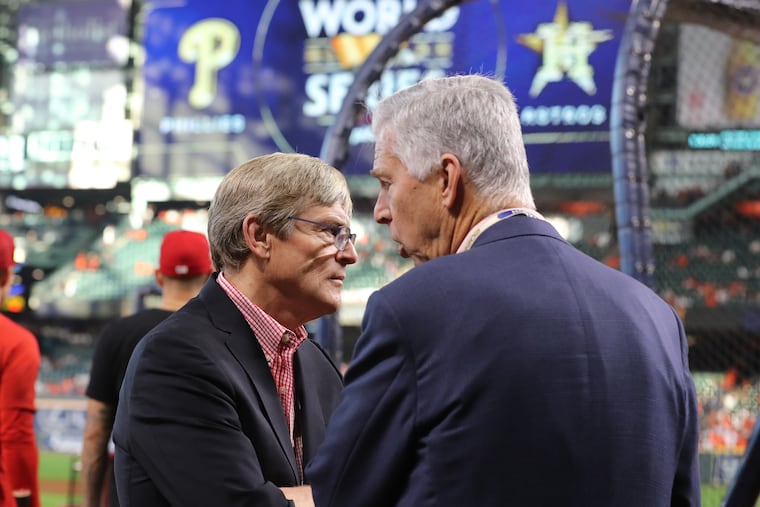John Middleton runs the Phillies like the fan he is. Dave Dombrowski lets him get away with it.
Middleton has always gone all-in on whatever strategy his advisers have recommended. More than his predecessors, Dombrowski channels that enthusiasm and wealth toward smart baseball decisions.

John Middleton was in his favorite place at his favorite time of year for his favorite reason, almost.
He was standing near the pitcher’s mound at Citizens Bank Park on the early evening of Oct. 23, 2022, a celebration swirling around him. Game 5 of the National League Championship Series had ended minutes earlier. You may remember it. Bryce Harper had laced a two-run, go-ahead home run in the bottom of the eighth inning. Ranger Suárez had thrown two pitches to get out of a ninth-inning jam and finish off the Padres. The people in the ballpark’s bleachers had gotten loud and stayed loud. The Phillies had not won the World Series, but they were heading to the World Series.
Again, almost.
» READ MORE: Kyle Schwarber’s MVP window just opened with Trea Turner’s arrival to the Phillies
“You’ve got to remember,” Middleton said before explaining what was important to remember about him, about his actions as the Phillies’ managing partner, and about his reaction to their success. He was 67 years old. He was born and raised in Philadelphia. He began attending Phillies and Eagles games when he was 5 years old.
Baseball had been dormant around here for years, but Middleton trusted that, if the Phillies started winning, it wouldn’t be anymore. That trust was validated. That trust made it easier for Middleton to give his Apple Wallet passcode to Dave Dombrowski in the offseason. That trust should make it easier this season for the Phillies to weather the absences of Rhys Hoskins, Bryce Harper, and Andrew Painter.
“I know this fan base,” Middleton said after Game 5. “I said to a lot of the guys here, ‘When we start to prove to these fans that we’re real, they will come out.’ I expected this.”
It was the proving that took a while. It took Middleton’s cycling through a few general managers and a few field managers before hiring Dombrowski and promoting Rob Thomson. There are benefits and drawbacks to having a lifelong fan of a sports franchise be in control of that franchise’s decisions and direction, and the Phillies have experienced just about all of them since Middleton became first among equals in their ownership group in the mid-2010s.
There was the abrupt turn, under Ruben Amaro Jr., from clinging to the glory years of 2007-11 to initiating a rebuild. There was the all-in-on-analytics period under Andy MacPhail and Matt Klentak. There were the Pete Mackanin bridge years. There was the Gabe Kapler experiment. There was Joe Girardi, laying eggshells below everyone’s feet.
» READ MORE: Baseball is speeding up in 2023, and new Phillie Trea Turner shows no signs of slowing down
Throughout all those stops and starts, Middleton was all in on whatever strategy happened to be the Phillies’ flavor of the moment. At least, he presented himself as such. It was a rather fan-oriented way to operate a major league organization:
We need to take these actions to win a World Series, and I believe in them. … Actually, now we need to take these kinda-sorta-opposite actions to win a World Series, and I believe in them just as much as I believed in those other actions that we’re not really taking anymore.
But there was no doubt he also struggled to hide his desire to spend the Phillies back into relevance and, after that, contention. Consider this quote from him following one of the Phillies’ major free-agent acquisitions on his watch.
The front office “came to us with a budget, and we said, ‘Guys, if you want to put that number in for the budget, that’s fine, but don’t live with that. If something comes up, and it breaks the bank relative to the budget, and you don’t pursue it, we’re going to be upset.’ And they know that.”
That quote wasn’t about the decision to sign Harper, or the decision to sign Trea Turner, or the decision to sign Kyle Schwarber or Zack Wheeler or Nick Castellanos. That quote was from December 2017, and it was about the decision to sign Carlos Santana to a three-year, $60 million contract. Yes, Middleton has been itching to use his wealth in the manner that anyone who is in possession of billions of dollars and has loved the Phillies all his life would use it.
“How much money did the ‘27 Yankees make? Or the ‘29 A’s? Or the ‘75-76 Big Red Machine?” Middleton told The Inquirer’s Scott Lauber in mid-February. “Does anybody know? Does anybody care? Nobody knows or cares whether any of them made any money or not. And nobody cares about whether I make money or not. If my legacy is that I didn’t lose any money owning a baseball team on an annual operating basis, that’s a pretty sad legacy. It’s about putting trophies in the cases.”
The difference now is that he has a player personnel executive capable of putting that vision into practice. What Middleton needed all this time was the right adviser, a sound and experienced major league mind to channel his resources in the proper directions. Amaro, for all the learning he did under Pat Gillick, had never been a GM before. Klentak hadn’t, either. Dombrowski has been one of the sport’s best for close to 30 years.
John Middleton has always done what the most loyal of Phillies fans would do. No matter the injuries or the obstacles, he has been willing to trust the person in charge of making the baseball decisions. For once, everyone else can, too.
» READ MORE: Top 10 things to know about the 2023 Phillies